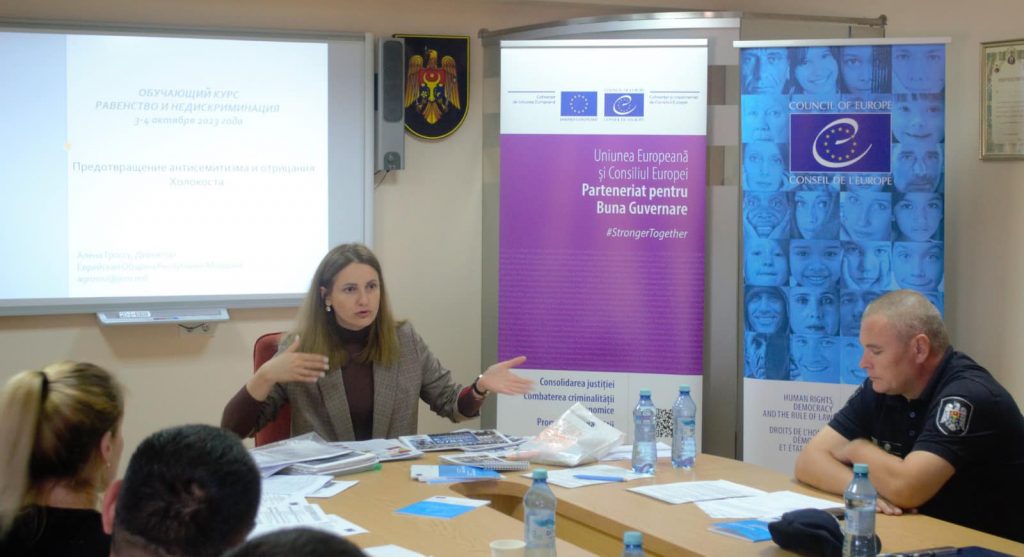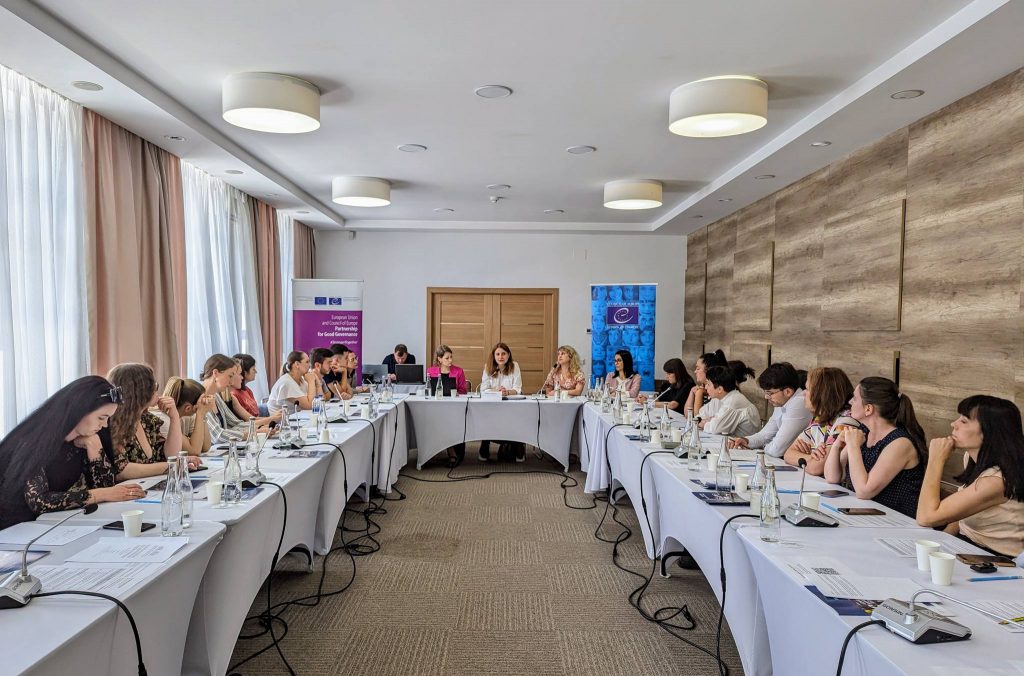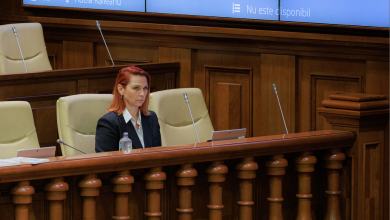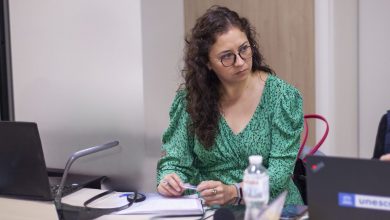Jewish Community Director: Journalists should be guided by maximum caution when covering topics related to antisemitism

The legislation of the Republic of Moldova includes the provisions on countering discrimination and hate speech, including against Jews, as well as sanctions for incitement to hatred or violence, Holocaust denial, the dissemination of Nazi or extremist propaganda or symbols, and the glorification of war criminals. However, according to Aliona Grossu, the Jewish Community Director, gaps related to the implementation of these legislations and sanctions still exist. She says that adopting a strategy similar to that of the European Union member states for combating antisemitism and supporting Jewish life would solve several issues. Media Azi discusses the concerns the community representatives face and the steps they take to prevent and combat antisemitism to promote human rights and social cohesion in our country.
Media Azi: As the Director of the Jewish Community of the Republic of Moldova (JCRM) and an expert in the sphere of interethnic relations and human rights, during recent years, you have been involved in various activities and processes for protecting the rights and freedoms of community representatives, combating antisemitism and other manifestations which reveal the degree of resilience in society. How do you assess the current situation in this respect?
Aliona Grossu: Actually, one of the roles played by civil society and us as an organisation is that of a watchdog – this implies monitoring and accountability in order to ensure that our involvement and contribution as civic activists is accepted and considered objectively. The episodes of discrimination, incitement to hatred, interethnic intolerance, or elements of antisemitism in the case of the Jewish community are obvious and worry us. These phenomena have especially intensified since last October, when the extent of antisemitism increased worldwide after the conflict between Israel and the terrorist group known as Hamas broke out. Unfortunately, violence persists to this day and results in casualties. This international situation evidently has its impact on manifestations of antisemitism and raises concern among our community members.
Does the Jewish community face any discrimination in the Republic of Moldova?
Episodes of antisemitism have been taking place throughout the ages, and they are not limited to this place. The national legislation includes a definition of antisemitism approved by the International Holocaust Remembrance Alliance (IHRA) the Republic of Moldova was also a party to as an observer state. The definition was approved by the Government decision and explains what exactly a manifestation of antisemitism is: it is not only about some incidents of direct aggression against the Jewish community representatives, but also against persons and property associated with this community. The approved definition has a comprehensive connotation and reveals that “antisemitism is a particular perception about Jews which can be expressed as hatred against Jews. Verbal and physical manifestations of antisemitism are aimed against Jews and non-Jews and/or their property, against Jewish communities’ institutions, and their religious locations.”
Could we say that this definition is completely comprehensive? In which way does it contribute to promoting anti-discrimination policies and improving tolerance in society?
The impact of such a decision is diminished by the fact that it does not stipulate any tools to be used in case of non-compliance with its provisions. This document is more of an informative nature. Consequently, we register various types and elements of antisemitism. Most often, they gain momentum in the public space where influencers, opinion leaders, and politicians are active, and also on social networks, in the online environment, where most messages promoting hate, incitement to discrimination and violence circulate, obscene language is used, xenophobia and antisemitism are promoted, etc. Our complaints concerning incidents involving prejudice against Jews and the Jewish community, expressed by councilors, deputies, or experts, have been duly registered with the Police and the Prosecutor’s Office.

What are these complaints based upon?
This year, in spring, for instance, on several roads in the country, at the public transport stations, anti-Israeli and antisemitic texts and symbols appeared. In addition, at the Jewish cemetery in Soroca, two incidents of vandalism at the Memorial to the victims of the Holocaust took place; these cases have sparked indignation in society, the media, and among public order enforcement authorities. We are deeply concerned by these manifestations of antisemitism, and we would like the state authorities to develop some more effective tools for preventing and countering all sorts of antisemitism.
How are such complaints typically being treated?
There have been several examples when complaints were initially filed to the Police and subsequently redirected to the Equality Council. The Council is specially empowered to deal with preventing and combating discrimination, but it can only examine them from the point of view of compliance with the current legislation. After that, the complaints are sent back to the Police, and it takes quite a long time (about a year or so) before they are directly examined.
We have an example from 2009 when a candlestick used for the Hanukkah celebration was brutally vandalized near the monument of Stephen the Great (in the center of Chisinau). The candlestick had been placed there on the eve of the holiday, and a group of people destroyed it, using obvious antisemitic slogans. At that time, there were no legislative or normative provisions to regulate this type of incident. No one was held liable. However, the facts were documented, and we had some evidence. Since then, things have been evolving, including in the legislative sphere, and crimes and speeches related to prejudice, antisemitism, as well as their detection and investigation, are currently very clearly described within the legal framework, and we intend to keep working on preventing and countering such incidents.
As far as I understand from the above, in spite of the fact that the current legislation lists a set of provisions, currently, there are gaps in their implementation. What else is supposed to be done?
You are right. Efforts are required to apply the legal provisions and to take some steps for prevention. In the context of our country’s European vector, we consider that a strategy for countering antisemitism and supporting Jewish life, similar to the one implemented by the member states of the European Union, is necessary: it could be used not only at the level of implementation/sanctions, but also at the level of prevention, awareness, and raising public awareness.
How exactly could such a strategy be useful?
A similar strategy could change many issues in our country. Any strategy includes an action plan, detailed activities, and a specific implementation plan, the institutions in charge, and an appropriately allocated budget. As long as we keep endorsing a definition that is not legally binding or do not invest financial resources in training officials to support its implementation according to its provisions, we will continue to have the same results as we do now. A decision which is neutral for some people may result in prejudice and/or intolerant, xenophobic, or antisemitic treatment for others.
Which steps does the JCRM take to reduce hate speech against Jews in society?
The Jewish Community of the Republic of Moldova is an umbrella organization for 45 non-religious and religious organisations at the republican and the local level; it provides support for research, culture, programs for children and youth, and volunteer movements, as well as assistance to the elderly and vulnerable persons from the community. Our organisation includes more than 15,000 persons and all the Jewish organisations and communities from both banks of the Dniester.
In June 2024-March 2025, among the recent activities, the JCRM implements a project titled Consolidating the Response to antisemitism in Moldova intended for contributing to creating a safer and more favorable environment for all members of society, building a more cohesive and tolerant community which is aware of human rights and respects them.

Within the project, we suggest various types of interventions, such as awareness campaigns and practical instructive sessions for improving the way the legislation is applied (increasing the comprehension and application of the legislation on countering antisemitism and denying the Holocaust); enhancing the community members’ capacities in order to detect and to report hate crimes, which will result in reporting antisemitic incidents more frequently; developing the national structure representatives’ and stakeholders’ skills of detecting, investigating, and sanctioning cases of antisemitism, and improving support for victims. Last but not least, we suggest promoting a safer and more inclusive environment by raising awareness and taking preventive steps.
As I have already mentioned, in the Republic of Moldova, we have no strategy which includes proactive steps, not merely retroactive ones. We consider that things would go differently if investments in the information, training, and education components are also made. To provide a solution to this issue, currently, we keep working on developing an informational support/practical guide for identifying, investigating, sanctioning, and preventing cases of antisemitism. The informational materials will be made available to all the stakeholders directly or indirectly involved in providing effective response to antisemitic incidents. We also intend to organise information sessions and training workshops in different regions of Moldova.
The project provides for an awareness-raising campaign to prevent and to counter hate crimes against the Jewish community; it is essential for promoting understanding and motivating stakeholders to report incidents related to antisemitism, xenophobia, intolerance, or discrimination. Besides, strengthening the capacities of vulnerable and discriminated Jewish communities is crucial so that they could provide an adequate response to manifestations of hate. It could be achieved by developing a detailed detecting, reporting, and monitoring tool described in an easy-to-use guide. This guide could also be used as a reference source for other ethnic communities encountering xenophobia, discrimination, or hate crimes. Besides, proactive steps for preventing and countering antisemitism, xenophobia, intolerance, and discrimination should be implemented by means of workshops and information sessions for legal professionals, the police and prosecutor’s office staff, and the Jewish community members.
Does prevention imply much work?
Quite a lot. The history of the Holocaust is not known well enough because it is not taught enough compulsorily at school and is insufficiently covered in informative materials often prepared by journalists. Such facts are not widely known, and it results in the situation which creates a sense of impunity. In addition, new sorts of this phenomenon emerge.
In early July, Meta announced expanding its hate speech policies by removing the content targeting Zionists. How efficient do you think this step is?
We are glad that Meta provided a prompt reaction to the request from the World Jewish Congress, the organisation we are members of, in order to identify new types of detecting and countering antisemitism online. It should be kept in mind that, even though Zionism as a term does not imply anything bad and merely defines the idea of establishing a Jewish state, it is frequently used with a negative connotation. We hope Meta’s new policy will help reveal the hatred directed at the Jewish community worldwide, and posts and messages which include the term Zionist will be regarded as antisemitic and removed or blocked from being publicly spread.
How do you generally see the situation regarding online discrimination in our country?
The incidents I have mentioned above are mostly spread via the news portals and social media. I have said in an interview for a TV channel that incitement to hatred has grown exponentially during the last year in the information networks, especially online. Virtually any article or interview that tangentially or directly concerns the topic of the conflict between Israel and the terrorist group known as Hamas gathers lots of comments. Quite often, we can see the lack of adequate moderation for the comments on certain news items. In fact, Internet users see the news articles or videos, as well as the comments displayed afterwards. The authors of the comments are not penalised for what they post, and we find this fact discouraging.
What do you think of the media’s role in promoting antisemitism and hate speech vs. countering it? Could you please provide any recommendations?
Definitely. Currently, we are at the stage of discussing a show broadcast by an information portal, with the participation of a politician and a historian. In our opinion, while formulating an answer to the question, the guest exactly repeated antisemitic arguments used by the Nazi troops during the Holocaust and listed in the report of the Elie Wiesel International Commission as justifying mass extermination of Jews. This is exactly what the report says: the Nazis used that argument to justify mass extermination, saying, “we exterminate them because they betrayed; we kill them because it is their own fault.” Both the international and the national legislation (because the report of the International Commission was approved by the absolute majority of the parliamentarians of the Republic of Moldova) stipulate very clearly that the crimes committed during the Holocaust cannot be justified.
Besides, we are outraged by the fact that the show host did not intervene, did not ask the guest any additional questions, and did not try to clarify his words so as not to leave any reasons for negative interpretations or reactions from the audience, and it obviously has a negative impact on our community.

Finally, what recommendations would you like to share with the journalists to demonstrate tolerance and fairness in their materials?
The first recommendation is not to hesitate to contact the Jewish community representatives if you have any questions or situations related to the community, traditions, or various aspects of our activity you are not sure about or unaware of. We are the first source, and we are always eager to explain, to provide some scientific, bibliographic resources, etc. This year, in spring, on a news portal, an article was published about a pride parade, in which pro-Palestine slogans could also be seen. Moreover, some civil society organisation representatives and civic activists expressed their opinion on this topic. The opinion of the Jewish Community representatives was missing from the material, and I find it weird and unethical.
The second recommendation is about studying the legislation in force before preparing a press material on a topic concerning Jewish history, traditions, and cultural and religious values. It is necessary for avoiding the situations which seem to be generated by certain prejudices or resemble antisemitic manifestations. The legislation and reports are mostly accessible and available online.
The third recommendation, which is no less important, is to be courageous enough to ask as many questions as possible and to demand counter-arguments from the interviewees. This is the only way to find out and to cover the truth. Sometimes, high-ranking persons, out of ignorance, haste, imprudence, or unawareness of the effect their statements could produce, publicly share some narratives which can result in unpleasant consequences for certain persons or groups of persons. Journalists should be cautious in everything they do. It helps stop false arguments from spreading, combat hate speech generated by prejudice, discrimination, and antisemitism, and contributes to producing journalistic materials which comply with the principles of ethics, deontology, fairness, and common sense.
This article is published as part of the “Get the Trolls Out!” project, the fifth phase of the program for encouraging young people to counter religious discrimination and intolerance in Europe. Within this project, the IJC has the task of monitoring several media outlets’ way of covering topics related to religious issues.




